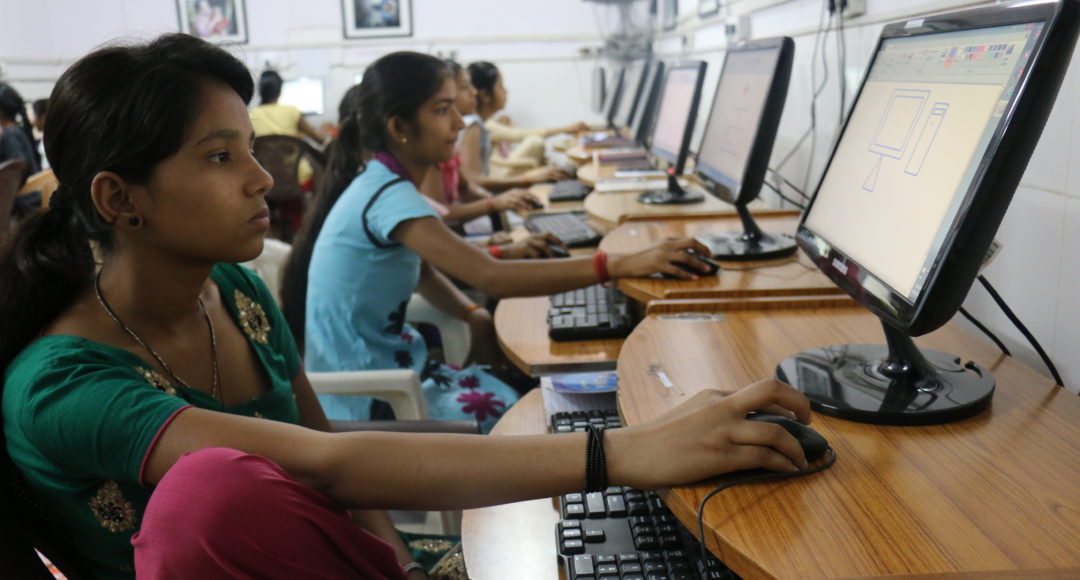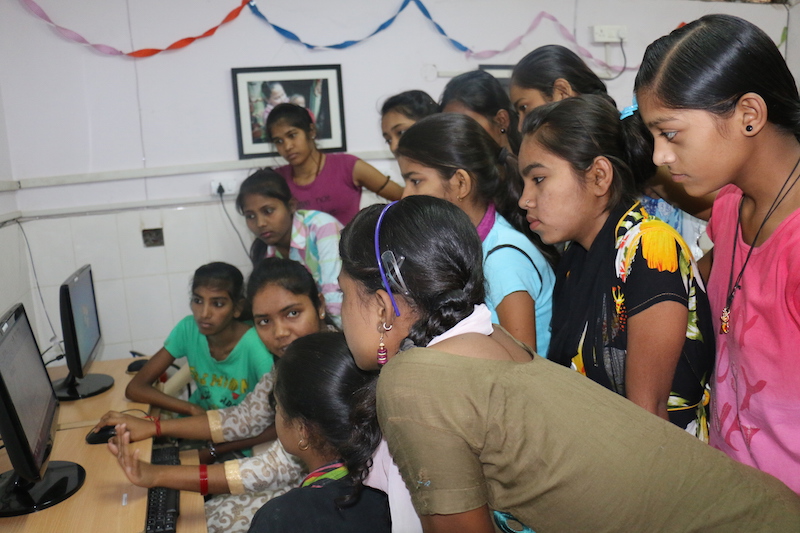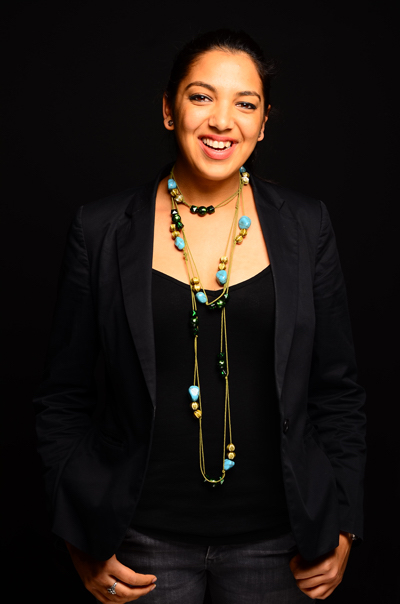Not “just a man’s business” - Indian women fighting for participation in the IT Boom

In hardly any other sector women are as poorly represented as in the software industry. But they do exist, the female Indian programmers. They are underestimated, rarely supported and have to face open sexism. But they want to encourage more women to dare entering the field of technology. A computer science student, a woman entrepreneur and the founder of an NGO ‘Feminist Approach to Technology’ explain how they assert themselves in the IT sector and how they would like to change it.
An article featuring FAT in German e-magazine www.deine-korrespondentin.de on 24th August 2016 by Lea Gölnitz. Translated by FAT's volunteer Marlene Mouson.
Since her 16th birthday, her parents have put her under pressure to get married. But when the family of a potential husband visited at home, Renu Arya dropped the tray with tea intentionally and behaved as bad as possible to put them off, tells the 22-year-old. Early on, she had understood that as a girl she was treated very differently than her brother. She was constantly controlled and her parents ridiculed her interest in technology and computers. It would be nothing for girls.
Arya's parents are not the only ones who think so. Girls and women in India rarely have access to computers and mobile phones and there is little investment in their education. In some cases, this is a question of resource allocation, because sons are preferred in the religious and conservative country. In other cases, men make restrictions just to exercise control. They do not want women to have unsupervised contact with other men through Internet and telephone.
If girls get denied access to usage of technology in such a way, this also affects universities and the labor market: The sex ratio of the highly renowned Technical University (IITs) in the country is 11:01. Female employees in the IT sector in India make upto 30 percent.
The information technology (IT) has become one of the leading industries and the most important exports of India. Hundreds of Indian and foreign companies employ more than three million employees. The turnover of the industry was 146 billion US dollars in 2015, according to NASSCOM, the federation of the Indian IT industry. In the industry, the incomes are high and programmers are greatly appreciated. A degree from one of the IITs is considered to be a job guarantee. More money and reputation translates to more independence from the family. This is particularly attractive for women. But the few women in the industry still have to struggle, getting sexist comments, being exposed to sexual harassment and hardly receiving any support.
When it comes to literacy, women are lagging behind from the start. Although there is progress now, the proportion of women who cannot read and write is still much higher than that of men, especially in India. Programming and the confident use of computers are the reading and writing of the 21st century. Therefore, there is a real threat of a second literacy gap between men and women.

This gap is particularly visible at the IITs. Here the number of female students has actually declined over the past five years - among the successful applicants, there were only nine percent women. The entrance exams for the IITs are very difficult: Those who take their application seriously, begin at the age of 10 to 15 years with the preparations at private coaching institutes. Women's rights organizations accuse the IITs for not taking the social conditions in India into account enough. Women are disadvantaged within the selection process.
For computer science student, Jigyasa Grover, it is clear that the situation of female programmers reflects the low status of women in the Indian society. When she began her studies in Delhi, she was one of the 20 women in a class of 150 students; a shock, after having spent the entire school time in a girl’s college. Also during Hackathons - competitions where programmers have 24 to 30 hours’ time to solve a problem or to develop something – Grover noticed how few women competed. Apart from her group - the ‘Girls’ Team’ – there were no women participants. Due to the regular reporting of violence against women, especially of rape, women go home before nightfall. Their parents do not allow them to be out late at night. Even the organizers of the Hackathons have suggested women to go home to sleep and come back the next morning. They could not take responsibility for the safety of women. "This is of course totally against the idea of the event. If they cannot ensure women’s safety and security , why do they not call it a ‘AllBoys Hackathon’ ? Then why are women invited at all? ", the 21-year-old outrages.
As the biggest challenge for women in the IT industry, Grover identifies the traditional gender roles in India. Women have less time because they are expected to take care of the household. Long nights of experimenting on the computer are not supposed to be a part of their lives. Security concerns discourage and generally prevent women from working outside the house. For Grover that was different. "Without a family that supports you, it is very difficult. In my family all women work, and I was taught how important it is to be independent. I travel alone to conferences and workshops,even abroad.”
To make the IT sector more women-friendly she is involved as director of ‘WomenWhoCode Delhi’ and ‘WomenTechmakers Delhi’ as well as a mentor and organizer of ‘LearnITGirl’ and in several mentor programs that support women in the industry.
"As a woman entrepreneur in the IT-sector, I am almost the only woman here"

(Alone amongst men – Shabnam Aggarwal, the founder of the tech-start-up ‘Kleverkid’, knows that all too well)
Being alone among men, Shabnam Aggarwal also knows that all too well. In their office in Shahpur Jat, an area full of narrow streets and the new home of Delhi's start-up scene, the Indian who grew up in the US speaks of the challenges as a female entrepreneur in the IT sector: "In India, it is already difficult as a woman. As a woman in the IT sector and as an entrepreneur, I am almost alone. In the past two months I have met almost 50 investors, not one woman was amongst them. "
Aggarwal, founder and boss of the tech-start-up "Kleverkid" wanted to combine her passion for programming with something meaningful. The 30-year-old studied computer science, worked on Wall Street, was a primary school teacher for a while, developed apps for slum dwellers and founded her own company. She has lived in India for seven years now and won’t let herself be slowed down and certainly not intimidated by the male-dominated industry.
"I am asked questions, no man ever has to answer. Why am I not married? Do I have children? Will I go right back to my family in case of the smallest obstruction?" says Aggarwal disillusioned. "It is assumed that I am less reliable than a man. Once I would have a family, I would drop everything. "
But she loves to fight prejudice. "But I cannot answer with a quick wit, I must stay respectful even while facing outrageous comments, and try to convince investors. And if someone is fundamentally convinced that a woman does the job worse than a man, I can’t do anything.”
A frustrating experience, for instance, was to wear a kurta as adviced by a consultant;. The western business attire Aggarwal usually wears would disturb the investors, he said. "Nobody tells Mark Zuckerberg, what to wear!" For the young woman, this is another example of sexism in the industry. When women are harassed or raped in India, media often blames the way they dress. But Aggarwal will not be discouraged and creates time and spaces for exchange and mentoring for her colleagues. In her company, which operates as a platform for educational programs for children, half of the employees are women. She is always happy to see female applicants. However, generally there are not many.
For Gayatri Burgohain, founder and director of the organisation ’Feminist Approach to Technology (FAT)’, this is not surprising at all. "Coaching institutes are big businesses, preparing for the IITs takes years and costs money, of course. Who would invest this much in a girl? Women do not even get primary education. The number of women participating in the entrance examination at all is very low and those who could prepare just as well as men, are even less. If companies would be seriously interested in recruiting more women, they would have to start at the roots and promote girls' access to computers and education.” This is what Buragohain’s organization FAT is working on for last six years.
Feminism and IT – women should use technology for their own purposes
"Technology is a great power factor. We have to ask ourselves: who controls technology? It is men, mostly white men. The power to create technology and decide how it is used lies in their hands. Why don’t we challenge this monopoly?” These questions made Buragohain engage with feminism and technology. She was surprised to find very little on the subject. Many women have been encouraged through the program ‘IT for Development- to use technology in development contexts’. But for Buragohain this is not enough.
Women should design and define technology and it’s usage themselves. "The discourse on women and technology was mainly dominated by the US and Europe. Women should use technology to contribute to the gross national product and be available as skilled workers to the labour markets, "says Buragohain.
"For me, it's about more than the right to work and participation in growth. For whom is technology created? How can women benefit in a constructive way? Who decides for what and how technology is used?”, explains the young woman who grew up in a conservative family in Assam, how she came to search for a feminist approach to technology. It is also the story to the name of the organisation which she founded in 2007. The first project "Young Women's Leadership Program" began in 2010 and provided computer courses for girls from Delhi.
Renu Arya was one of the participants. "This is a one year course, but I finished it in ten months," she says proudly. Now she is studying, living alone in Delhi and has not been married. "FAT has changed my life. I am no longer dependent on my family and I know that as a woman I can do what I want, and that technology is helping me." Within FAT, she developed plays about feminism and technology and introduced them to the local communities. "With the plays I intend to show how patriarchy prevents access to computers and mobile phones.”
The program successfully runs for six years now and has produced many role models in the communities. The 14 to 24 years old women learn to use computers, Internet, filmmaking and photography independently to enforce their rights. Girls who never had an access to technology form the target group. Through the Internet, they can exchange ideas and information about their rights and use film and photography to explain their situation and spread it online. With this, access to technology has finally been recognized as an important women's rights issue and this pleases Gayatri Buragohain.
Submitted by gayatri on Sat, 09/24/2016 - 18:04
- Log in to post comments


